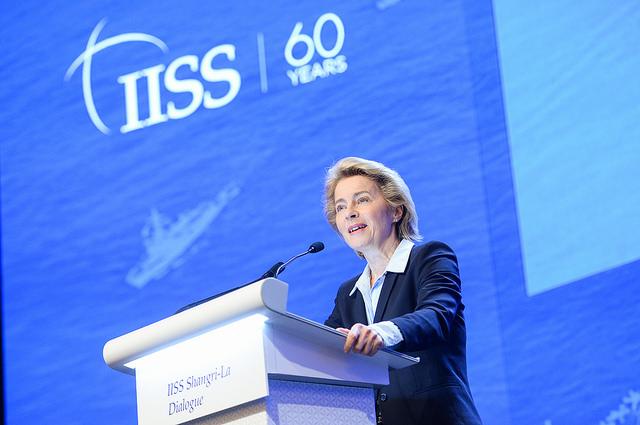
In the second decade of the modern age of terrorism, it’s a cliché to say that the struggle will last decades. But even if a cliché is stale, it can express a major truth.
So the cliché leads to the truism that this fight is about generations, not just decades. The truism is also stale—yet, equally, it’s a statement of a big, enduring reality.
Strategic and political attention is stretched because the new age of terrorism stands beside the resurgence of old-fashioned power politics.
States compete against states as the non‑state actors attack the state.
We should be getting used to this dissonance because it’s been the discordant script of the 21st century.
Getting ready for this year’s 17th Shangri-La security dialogue, I was sorting through files and out dropped a copy of the speech that Singapore’s then senior minister, Lee Kuan Yew, gave to the first International Institute for Strategic Studies (IISS) conference in Singapore in May 2002. It struck me that the way I’d marked up that speech for news yarns in 2002 was exactly how I’d write similar news stories today (a news headline can be an attempt to make fresh what history has already written).
For all that we’ve been through, LKY’s speech served as a working text for much of what was discussed at the weekend. Back in 2002, Lee reflected that US–China relations were central to Asia’s strategic balance:
As a rising power, China cannot be expected to acquiesce in the status quo if it is against its interests. As the pre‑eminent global power, US interest is in the preservation of the status quo. This fundamental difference of interests cannot be wished away. To be sure, China is no longer revolutionary and the US has never been reactionary. Conflict is not inevitable.
Then LKY turned to what was then the just‑arrived globalised age of terror:
A Muslim terrorist is more potent operating transnationally than a communist terrorist. Malayan communists (which included Singaporeans) would not put their lives in the hands of Indonesian or Vietnamese communists. An obstacle to co‑operation between communists was ethnicity and nationalism. But Al‑Qaeda and similar Muslim terrorists share a deeply-felt sense of Islamic brotherhood that transcends ethnicity and national boundaries. Militant Islam feeds upon the insecurities and alienation that globalisation generates among the less successful.
As it happened, I was not the only one who’d been re‑reading LKY. During the inevitable session on terrorism, an intellectual luminary of the IISS, Francois Heisbourg, predicted that Shangri-La conferences decades from now will still be arguing about terrorism. His question: ‘Will we have the strategic patience to deal with jihadi terrorism?’
The discussion of the significance and implications of the siege of Marawi was a debate about the way the threat keeps morphing.
In its annual regional security assessment, IISS began the Marawi chapter:
On 23 October 2017, the Armed Forces of the Philippines (AFP) announced that it had formally ceased military operations in the city of Marawi, after months of clashes with pro‑Islamic State, also known as ISIS or ISIL, militants who had captured the city on 23 May. Sporadic fighting continued until mid‑November. By the end of the 154‑day siege, some 1,132 militants, soldiers, police and civilians had been killed, while 400,000 local inhabitants had fled. Marawi was left in ruins.
IISS offered these judgements:
- Marawi was ‘a major intelligence failure’ by the Philippines.
- The siege was a major setback for ISIS ambitions in Southeast Asia because many militants were expelled or killed. ‘On a deeper level, however, it may pay some strategic dividends for the militants, as ISIS has morphed into a virtual caliphate.’
- Jihadists continue to hold territory and the southern Philippines ‘remains the most hospitable Southeast Asian destination for militants returning from Iraq and Syria’.
In the terrorism session’s question-and-answer, the Philippines Defence Secretary, Delfin Lorenzana, gave a succinct summation: ‘How can we avoid the same mistake? By learning from it.’
A fine speech by the German Defence Minister, Ursula von der Leyen, offered these ideas on what we’ve learned about the age of terrorism:
- It takes a network to fight a network: terrorism that uses diverse, hybrid means requires a ‘hybrid defence’.
- We have to win the battle for attention: ‘ISIL’s recruitment strategies are advanced and highly professional. 90% of its propaganda is distributed through visual content. It appeals to the emotional level by using imagery and music which skilfully replicate the aesthetics of popular video games.’
- We must strengthen fragile countries and regions that are vulnerable to terrorism: ‘The fight against terror needs a local face.’
- Terror needs money and communication: disrupt all terrorists’ channels, everything from ‘black market operations, the cashing in on hostage-taking and art theft’.
- The return of fighters harbours an enormous risk: coming back from the battlefields, the returning fighters ‘are combat proved, radicalised, often traumatised and brutal, and they are mobile’.
Dr von der Leyen finished with a statement of first principles in dealing with transnational terrorism:
The rule of law and our values must be respected. Because human rights and the rule of law apply even to the worst criminals. At the end of the day, we will only succeed if we steadfastly defend this most fundamental of principles: The power of the law must prevail over the law of power.
That’s an elegant sentence to hold to in contemplating the long age of terrorism:
The power of the law must prevail over the law of power.